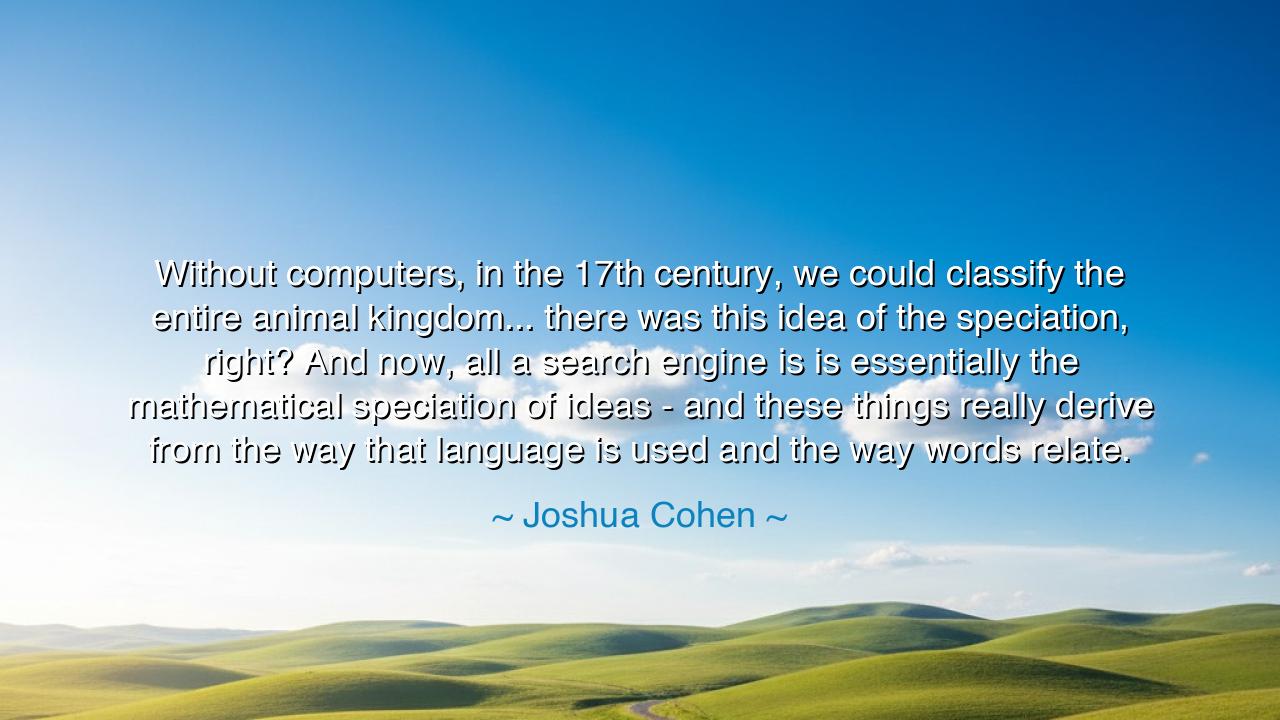
Without computers, in the 17th century, we could classify the
Without computers, in the 17th century, we could classify the entire animal kingdom... there was this idea of the speciation, right? And now, all a search engine is is essentially the mathematical speciation of ideas - and these things really derive from the way that language is used and the way words relate.






In an age when thought has become entangled in the vast web of machines, Joshua Cohen, a chronicler of the digital soul, spoke words of deep reflection: “Without computers, in the 17th century, we could classify the entire animal kingdom... there was this idea of the speciation, right? And now, all a search engine is is essentially the mathematical speciation of ideas — and these things really derive from the way that language is used and the way words relate.” These are not idle musings. They are the utterance of one who peers through the gleaming mirrors of technology and sees reflected not merely circuits and code, but the eternal dance of knowledge, order, and meaning. In his words, the present converses with the past; the search engine becomes the heir of the natural philosopher, and language itself stands revealed as the bridge between life and thought.
To understand this wisdom, we must journey backward — to the seventeenth century, when men like Carl Linnaeus, John Ray, and their forerunners sought to impose harmony upon the wild abundance of nature. Without computers, without even the printing power of our time, they undertook the grand labor of naming, sorting, and classifying the living world. They saw the divine pattern behind the chaos of beasts and blooms, believing that by discovering order in the animal kingdom, they might glimpse the mind of the Creator. Their speciation was not merely a scientific pursuit; it was a spiritual act, a declaration that beneath all variety, there lies relation — that each thing, however humble, has its place in the grand design.
Now, as Cohen observes, our machines have inherited this ancient hunger for order. The search engine, that invisible oracle of our age, does not classify bodies but ideas. It performs, with numbers and algorithms, what Linnaeus once did with parchment and ink: it sorts, connects, and maps the living web of human language. Every word becomes a creature in this digital ecosystem, every link a lineage, every pattern of use a kind of evolution. In this way, the machine mirrors us — for its “intelligence” is not its own, but born from the ways we speak, write, and imagine. As in the forests of life, so too in the forests of meaning: relation defines existence.
But there is a warning folded within Cohen’s insight. For while the naturalists of old sought to comprehend the world through reverence and wonder, our machines classify not to understand, but to predict. The speciation of ideas in the age of search is not born from curiosity, but from consumption. The search engine’s universe of thought grows ever more intricate, yet ever more mechanical. Ideas are ranked not by their truth, but by their repetition; words are valued not for wisdom, but for popularity. Thus, the danger arises that humanity, in teaching machines to think, may forget how to think deeply itself. The forest of language risks becoming a labyrinth of echoes, where meaning drowns in the flood of its own abundance.
Consider the example of the Enlightenment encyclopedists, those valiant minds who once sought to gather all human knowledge into a single work. Diderot, d’Alembert, and their peers labored by candlelight, guided by a vision not of profit, but of enlightenment. Their classification of ideas was an act of liberation, meant to scatter light into every corner of ignorance. Compare this to the modern digital library — infinite, yes, but impersonal. The knowledge is vast, but the wisdom is diffused. The machine catalogues, but it does not care. It arranges thought, but it does not understand it. Cohen’s words thus strike with double meaning: we have built a new Tree of Knowledge, but do we still taste its fruit with reverence?
From this reflection, a lesson arises for all who live in the glow of screens. Remember that the search for order is not an end in itself. Classification without contemplation is but a hollow ritual. The true philosopher, ancient or modern, does not merely sort knowledge — he listens to it, feels its pulse, traces its connections to the heart of human experience. The search engine may map ideas, but only the soul can discern meaning. Therefore, use the tools of the age, but do not let them use you. Let technology extend your sight, not replace your vision.
So, my listener, guard your relationship with language. Treat every word as a living thing — born of history, shaped by thought, bearing the breath of countless generations. When you type a query into the machine, remember that behind each answer lies the labor of minds who sought truth before you. Honor that lineage. Seek not only information, but understanding; not only connection, but wisdom. For the mathematical speciation of ideas, as Cohen reminds us, is only the shadow of a deeper reality: that language is life, and to know how words relate is to glimpse the structure of the soul itself.






AAdministratorAdministrator
Welcome, honored guests. Please leave a comment, we will respond soon